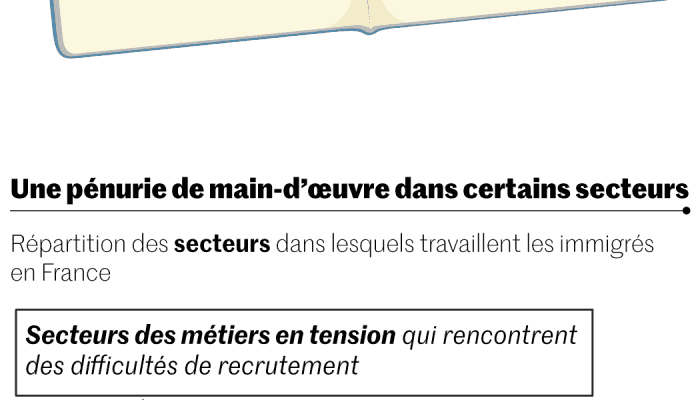InvestigationWhile one in two companies is struggling to recruit, many highly sought-after foreigners are struggling to obtain a work visa. In France, the employment component of immigration has long been flawed by its inadequacy to market needs.
They are craftsmen, bakers, restaurateurs, butchers, caregivers. And always a little more numerous to mobilize to prevent the expulsion of an immigrant employee on whom they know how to count. They are also foreigners but graduates in France, sometimes researchers in prestigious laboratories, without managing to renew their residence permit, a condition sine qua non to be able to work.
A few weeks before the presidential election, when questions of identity and security mingle and hysterize the debates on immigration, these stories tell another story: that of the labor shortage, Kafkaesque administrative brakes and the contribution of immigrants – whether graduates or not – to the economy. They recount their essential presence, like these caregivers on the “front line” applauded at the start of the pandemic. They show, in hollow, at the other end of the spectrum, the low influx of more qualified foreigners. “So France, 6and world economic power, is only 19and in the global “competitiveness and talent” ranking compiled by [l’école privée de management] Insead, which measures a country’s ability to attract, produce and retain talent”, note economists in a note from the Economic Analysis Council of November 2021.
Unskilled labor
Immigration has always fulfilled a role of compensation where there was a vacuum, where the needs were not met by the local population. Both in trades for which demand is increasing sharply and in those which are in decline, such as crafts in the process of being mechanized or delocalized. Admittedly, since the era of specialized workers (OS) at Renault in Boulogne-Billancourt described by the sociologist Abdelmalek Sayad in 1986, the profile of working immigrants has diversified. More and more are practicing a qualified profession, like the 11.5% of doctors trained abroad, or the many Tunisian computer engineers.
But foreigners remain overrepresented in the most difficult jobs: half of them work in construction and public works or in services to individuals and communities. It is these precarious jobs that have the most difficulty in recruiting at the time of recovery. Example, in house jobs where one position in five is held by a foreign person from outside the European Union. And where nearly half of the employees are expected to retire before 2030. “It will take no less than 600,000 recruitments to compensate for these cessations of activities”, warned Marie-Béatrice Levaux, president of the Federation of Individual Employers of France (Fepem), as part of the parliamentary inquiry into migration, in July 2021.
You have 76.96% of this article left to read. The following is for subscribers only.

